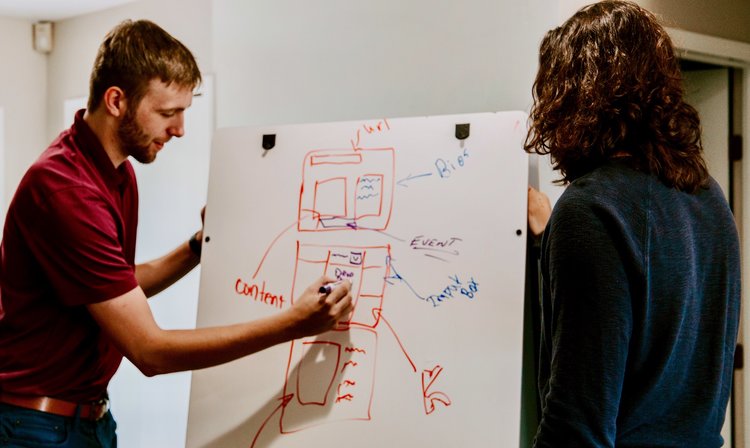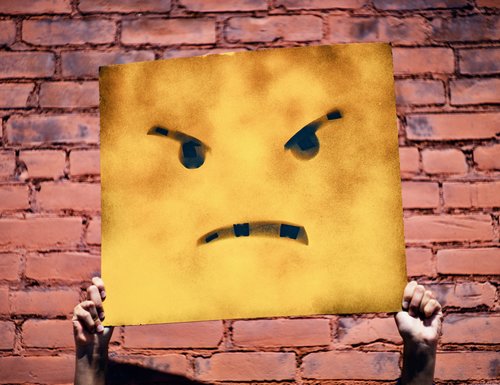 I became a content creator when I was 18 years old.
I became a content creator when I was 18 years old.
I had no idea what I was doing then. And my first YouTube videos were awful.
But you know what?
It was worth it.
The memories I made and the people I met helped me through an otherwise lackluster time in my life.
But this teenage experience wasn’t just a highlight of my youth. It also gave the foundation for me to be a content creator today.
And now with the added experience of writing for HFE, I figured I’d give potential creators an idea of what to expect.
So if you want to be a content creator now, answer these 10 questions first:
#1 Would you do it if you weren’t paid?
Becoming a content creator is a lot like the job search after college:
To get the “entry-level” position you want, you need two years of experience.
Yes, that number varies for each person, but assuming you haven’t gathered an audience beforehand, it’s gonna take time to build one of your own.
“But that’s why you advertise!”
Yep, you’re right. You probably will gain an audience if you advertise…
…but you won’t be ready for it.
These 2 years aren’t just about building an audience. They’re about letting your skills develop.
You wouldn’t hand a T-bone steak to a baby would you?
What’s a baby gonna do with that?
Stare at it? Choke on it?
The baby’s teeth haven’t come in yet. It’s not capable of eating or even appreciating the steak.
You have to let your teeth develop first. That’s why you don’t really want an audience at the start.
The beginning is your rehearsal. It’s time to find your voice, to refine your style, and to practice so much that it doesn’t matter if ten people watch or ten thousand.
You can’t worry about external rewards and you for sure can’t worry about money.

I make more money on a Tuesday morning at my day job than I’ve made on HFE and YouTube combined. Now granted I don’t directly sell anything or take donations on this site, but even if I did, it would just be side change.
Your motivation has to be internal to do this. Because if you’re looking for rewards now, you either:
A) Need to find something else, or…
B) Should have started two years ago.
#2 Can you endure being ignored?
This question is similar to the previous one. But you’ll need to endure being ignored not just because you’ll lack an audience, but because of the nature of the job.
People think an audience will solve all their problems. They think viewers will cling to their every word, video, or podcast. But that’s not how it works.
Look at popular music artists today for example, and only five songs will come to mind when you think of each. Yet those five songs are nothing compared to those artists’ discographies.
Most of their music is (relatively) ignored and they’re mainly known for their top hits. And this observation shows the Pareto Principle at work.
If you don’t know what the Pareto Principle is, it states that the largest percentage of results—roughly 80 percent—are due to a small percentage of causes—about 20 percent.
So as a content creator, you can only expect about 20 percent of your work to have the biggest influence. The other 80 percent is “normal” content that will mainly be consumed by your core audience.

I’ve seen this principle to be true both on YouTube and HFE:
As a small Youtuber, I had a handful of videos that raked in thousands of views, but my normal stuff only generated about 500 each.
HFE has about five articles that really drive the traffic—they’re my cornerstone content—but the other posts are mostly read by returning visitors.
This is one reason why you can’t obsess over numbers. No matter how good your content is or how big of an audience you have, the same principle applies. And if your core audience is small, you’ll still get little to no feedback no matter how many “hits” you’ve made.
There’s also a large comment to view discrepancy as anything that requires effort won’t occur as often as a simple view. Plus your promotion strategy and tactics aren’t guaranteed to work.
People you reach out to won’t always say “yes”. And if you’re like me and mainly let God and Google handle promotion, you probably won’t hit the numbers you’d like.
So there’s a lot of factors that go into this. But the constant here is that you will be ignored—in one way or another.
#3 Can you make the time?
Content creation isn’t as simple as hitting publish after a weekend of light work. A lot more goes into the finished product. Well, it does if you care about your work.
I’d say at least four dedicated hours should go into every 1,000 words of a blog post. You have to outline, research, write a first draft, make revisions, look for pics, and so on. Then you may have to start over if you don’t like what you see.
Now sure, there are ways to optimize this process, but time is time. It has to come from somewhere.
That may mean you get up early to record before work. It probably means you miss out on shows when you come back. But that’s the nature of making time.

This is why I’m a big advocate of getting your feet wet while you’re in college (or whenever you don’t have eight hours dedicated to something else).
I’m always searching for better ways to use my time now. I hate how inconsistent my posting has become.
I could sit here and make (valid) excuses all day, but no one cares about that out here.
Content is king. You have to create.
And if you want to create, you need to make time.
#4 Do you think good is good enough?
The internet is far past the “get-a-million-views-for-a-lasagna-recipe” stage.
The web is flooded with content now. So if you want to stand out, you have to go above and beyond what’s already available.
I’m a one man show at HFE for example, and I don’t enjoy writing for the sake of it, so you’ll never see daily uploads here.
I’m better at presenting developed messages that have depth. So one strategy that’s given me an advantage is the comprehensive route.
This is where I combine everything I know about a topic into one post while keeping it simple for beginners. A lot of effort also goes into making these posts engaging since they tend to be on the longer side.
This strategy is great since the internet is a puzzle of niche information that’s tough to sort through. And most longer articles tend to read like Wikipedia knock-offs.
Google also loves the comprehensive style which makes it a great way to attract new visitors.
This strategy works well for me and it fits my personality, so I try to use it whenever I can. But no matter what style you decide on, you have to separate your work from the sea of content out here.
Information isn’t enough anymore. You need character, stories, production, art.
Yeah, that sounds like a lot of work. But isn’t that what you’re signing up for?
#5 Can you handle criticism and hate?
 First, you need to know the difference:
First, you need to know the difference:
Hate focuses on you. Criticism is about the work.
There’s nothing wrong with criticism. It shows that people care about what you’re doing.
Criticism starts a discussion. And discussions help everyone involved.
You should care enough about your work that you’re your own worst critic anyway. People’s words should only confirm what you already know to improve.
But hate on the other hand, solves nothing. Hate doesn’t build anyone up. And it doesn’t add to the conversation. It’s just kinda there, wasting space.
This is why you have to know the difference—especially if you make controversial stuff.
You can try to build discussions out of hate, but it often devolves into name-calling or a plea for you to apologize. And you can’t let random people rope you into that.
Just ignore and delete it all. That’s been my hate strategy for years now. I accept discussions but I don’t tolerate attacks.
And if you’re gonna be a content creator, you’ll need to be proactive towards hate too:
- Decide what you’re willing to accept beforehand.
- Learn how your platform allows you to curb hate.
- Practice ignoring slights in the real world too.
Remember that trolls only have as much power as you give them. So prepare for them long before they mess with you.
#6 Are you afraid?
A little fear is actually a good thing. It means you care about the influence you’ll have.
People who don’t care are dangerous. They’re loose cannons who aren’t bothered by errors, lies, or mediocrity.
That’s why a little fear is healthy. But if you’re paralyzed by it, just step back and think:
- Can anyone fault you for honest effort?
- Why do you care about a spectator’s opinion?
- And what if something you make actually helps people?
Paralyzing fear shows you’re too worried about yourself. You’re worried about looking good, being rewarded, or gaining respect. But what about your audience? Have you thought of them?
They may not tell you, but your content may help them get through the week. Readers may email you saying how much they relate to you. A viewer could connect with your work so much that they send a dream opportunity.
So stop obsessing over yourself and think about them.
Fear fades when your follow your purpose. If this is what you’re meant to do, be bold, and go do it.
#7 Do you have to be told to work?
A content creator is an entrepreneur who will have an even tougher time being rewarded.
The amount of work you have to do up front before seeing anything will discourage you. And you won’t have a boss telling you what to do or giving a salary to do it.
You will be, for the most part, all alone.

Yes, you can network with other creators and build connections online. But those people can’t do the work for you. That part is on you.
This is why you have to set your own work standard. People still think internet work is twiddling your thumbs while tucked in bed, but the best content creators treat their work more seriously than a 9-to-5:
- They’re up earlier and they work longer hours.
- Weekends are the furthest thing from time off.
- And they find crazy ways to fit work in the smallest holes of their schedule.
Almost every time I write a post now, I jump out of bed, take a quick shower, and head to the library. I’ve been to the library so many times they should name a study room after me.
I wouldn’t do work for my day job in bed. So why in the world would I stay there for work of my own?
That’s the seriousness you need as a content creator. Sure, you want to express passion and fun in your work, but your approach towards doing it can’t be taken lightly.
#8 Do you love to learn?
All content creators are learners.
It’s impossible to keep pumping out material without learning something new.
But besides the actual content, you’ll also have to learn for your medium:
- Your video editing software won’t run itself.
- Your current writing style may not be capable of engaging readers.
- And you may need to dabble in code to make changes to your website’s design.
Those are all opportunities for you to learn more. But keep in mind that something will always go wrong too—no matter how prepared you are.
Back when I first launched HFE for example, I nearly broke down after I crashed the site with code changes.
I was sweating, I couldn’t think straight, and it was all due to the white screen staring at me.
But once I calmed down and did a quick Google search, I found a solution. All I had to do was change some files on the back end and the site was up and running. I freaked out over a ten minute fix—and I couldn’t help but laugh afterwards.
That’s why learning has to be a tool in your back pocket: something will always go wrong.
And as a content creator, it’ll be your job to figure it out.
#9 Can you perform under pressure?
I love challenges.
I’m a naturally competitive person and I love responding to arguments, messages, and viewpoints.
Some of my best work happens when I know a problem needs to be set right.
And to be a good content creator, you need that kind of grit.
No, I’m not saying you should start fights or look for drama, but you’ll eventually hit a block that requires you to take it up a notch.
Whether it’s dealing with false accusations, refuting a misinformed statement, or just reminding yourself of previous victories, you’ll have to lock in, and do what you do.
Adversity will test you to see if you’re meant for this. So don’t run from it.
Flip that switch, and start showing off.
#10 Do you have the itch?
 If your answer is yes, forget every other question and do it.
If your answer is yes, forget every other question and do it.
You can ask friends about what they think, you can watch videos to see if you should, and you can read posts like this to confirm it. But there are some things you just know.
When you’re the black sheep wherever you go, that’s when you’ll know. When the normal life makes your stomach churn, that’s when you’ll know.
Normal is something I’m still trying to understand. I have no idea how people do what they’re told for 8 hours and then come home and do nothing.
TV is so boring to me. I don’t want to waste my life watching shows.
No, my 401k doesn’t excite me. I’m not interested in politics at all. And I refuse to worship one day of the week while accepting four others as torture.
Look, I’m sorry for sounding like a snob, but life without the ability to create isn’t life at all. I have no interest in fulfilling someone else’s purpose while mine drifts to the wayside.
I don’t care if I’m the smallest and most insignificant blogger on the planet, I just know I have to make something.
The itch is a gift and a curse man. No matter how much you create, it comes back. No matter how good the old stuff was, it comes back.
And if you know what any of this feels like, I’d say it’s time for you to jump in.
Will You Take The Leap?
So those are the ten questions I’d ask before you start.
There’s a lot of hype around being a content creator now, but hopefully this gave an idea of what to really expect.
Sure, the job’s not glamorous at first. But once you a gain a little experience, life won’t be the same without it.
So if you think you’re ready now, hurry up and take the leap…
You’re already two years behind.
-Drew
Leave a Reply